


There are a lot of methods and techniques on the Internet to help people with insomnia fall asleep, but are they really useful? Can these home remedies for insomnia help treat insomnia naturally?
We all have evenings when we find it hard to fall asleep or we wake up within the night. Insomnia, or trouble falling asleep or staying asleep, is a common sleep disorder. In this article, we will look at some common natural remedies that can help to combat insomnia.

Insomnia is a sleep disorder that is characterized by persistent trouble falling asleep or staying asleep [1]. Insomnia can be triggered by a variety of factors. It affects people across the spectrum of age and lifestyle, from teenagers to seniors.
Short-term insomnia is usually caused by stress or changes in your environment. Stress can lead to a racing mind and difficulty in switching off. Likewise, anxiety and depression often disrupt sleep patterns. They often create a vicious cycle where a lack of sleep exacerbates mental health conditions.
Chronic insomnia is when it occurs for more than three nights a week and lasts for longer than 3 months. It can sometimes happen without a cause or a result of other underlying medical conditions.
Some other causes of insomnia also include:
If you’re wondering how to swiftly tackle insomnia and unlock the benefits of a better night’s sleep, start by considering lifestyle changes and insomnia natural remedies.
In the next section, we’ll discuss a variety of holistic strategies that can help you overcome sleep disorders like insomnia and promote good sleep hygiene. These methods include practical lifestyle adjustments and relaxation techniques that are free from side effects.
Make your bedroom more sleep-friendly by making sure that it is dark, cool, and quiet. This means using curtains that block light and using an air conditioner to ensure that the room is at a cool temperature.
If you are sensitive to loud noises, you may consider using earplugs or a white noise machine to block them out for better sleep. A comfortable sleep environment will help you to fall asleep much faster.
Ideally, you should only be on your bed when it’s time to sleep or rest. You should not spend time in bed doing activities such as reading, watching television, texting, or talking on the phone. According to sleep experts, doing so can form a negative association between the bed and wakefulness.
Instead, you want to condition the brain to associate the bed with sleep and not with waking so that it is easier to fall asleep at night [2].
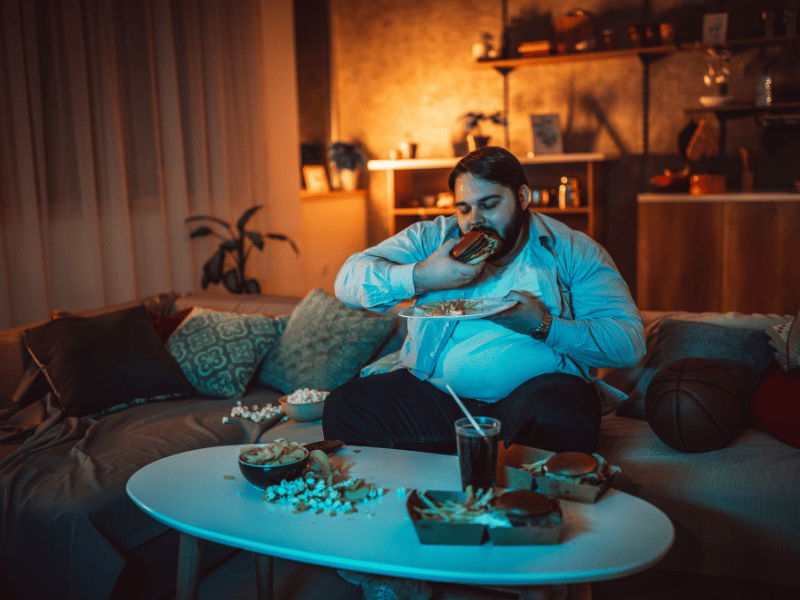
Dinner should not be eaten too close to bedtime, at least 3 hours. Our bodies need at least a few hours to fully digest food. Sleeping after eating may cause acid reflux and digestive discomfort. This may cause you to wake up frequently throughout the night, resulting in fragmented sleep.
Regular exercise is something you should do. One of the easiest strategies to fall asleep and get consistent sleep is to be physically active through regular exercises. However, exercising right before bedtime may make it difficult to fall asleep. Thus, it is best to avoid exercising at night when you are about to sleep and instead, stick to daytime.
Mindfulness meditation is a mind-calming practice that emphasizes breathing and present-moment mindfulness. It can help you get rid of insomnia faster if you practice it daily.
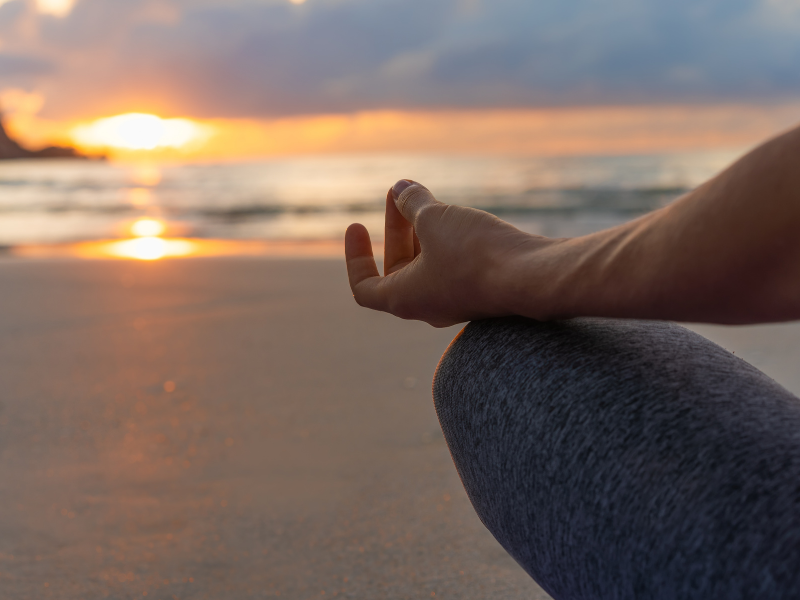
Before going to bed, let go of all your anxieties. Before you have a good night’s sleep, try to stay comfortable and tranquil in your bed. Before you go to bed, reflect on what happened during the day; you can jot your ideas down on a piece of paper to relieve stress and anxiety. This will keep your worries from interfering with your sleep.
Sleep affects every aspect of health. Fortunately, some foods and beverages contain components that help control sleep cycles, which means they can aid in falling and staying asleep.
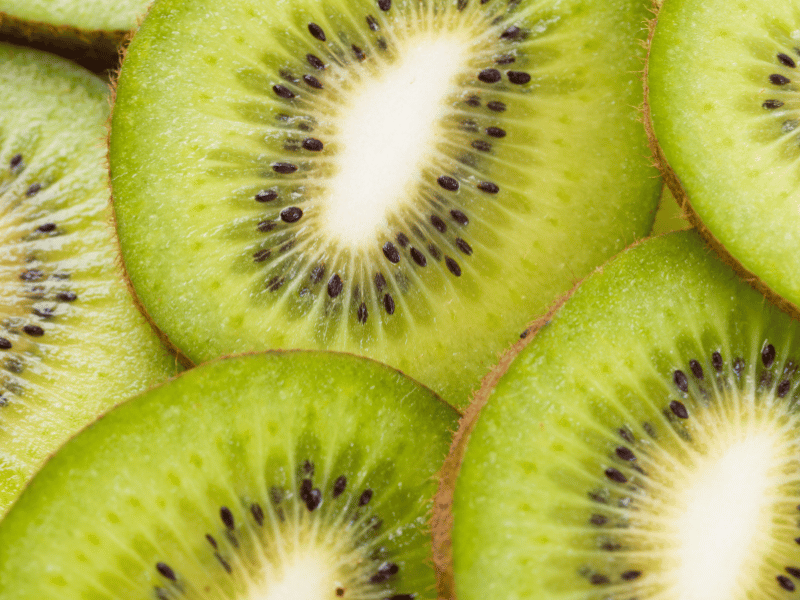
Kiwifruit presents numerous sleep benefits. It contains vitamins and minerals, like vitamins C and E, as well as potassium and folate. In a study, people who ate two kiwis one hour before bedtime for 4 weeks fell asleep faster, slept longer, and had improved sleep quality [3].
It’s been researched and discovered that fatty fish is a natural remedy for sleep disturbances. The study over a period of months found that people who ate salmon three times per week had better overall sleep and daily functioning. Fatty fish, according to researchers, may aid sleep by supplying a healthy amount of vitamin D and omega-3 fatty acids, both of which are important in the body’s serotonin control [4].
Nuts such as almonds, walnuts, pistachios, and cashews are commonly recommended as healthy sleep food. Nuts are melatonin-rich foods, containing vital minerals like magnesium and zinc, which are required for a variety of biological functions.
Tart cherry juice is often lauded for its potential to alleviate insomnia and enhance sleep. This is mainly attributed to its rich melatonin content, a hormone that regulates the sleep-wake cycle. Additionally, the high antioxidant levels in cherries may help reduce inflammation and oxidative stress, which can disturb sleep.
Some studies suggest that regular consumption of tart cherry juice may lead to longer sleep duration, quicker sleep onset, and improved sleep quality [5], [6]. To incorporate it into your routine, consider drinking it a few hours before bedtime in moderation. However, if you have chronic insomnia, consider consulting a healthcare professional.

Valerian root is often considered one of the strongest herbs for promoting sleep and addressing sleep-related issues. Valerian has been used for centuries as a natural sleep aid for insomnia and anxiety. A common theory is that it stimulates the nerve cells to release a chemical called GABA. GABA slows down brain activity, helping you to relax and wind down for rest [7].
Many people use valerian root in various forms, such as herbal teas, capsules, or tinctures, to alleviate sleep disturbances and improve sleep quality. While its effectiveness can vary from person to person, valerian root is a popular and widely recognized herbal option for those seeking a more natural approach to addressing sleep problems.
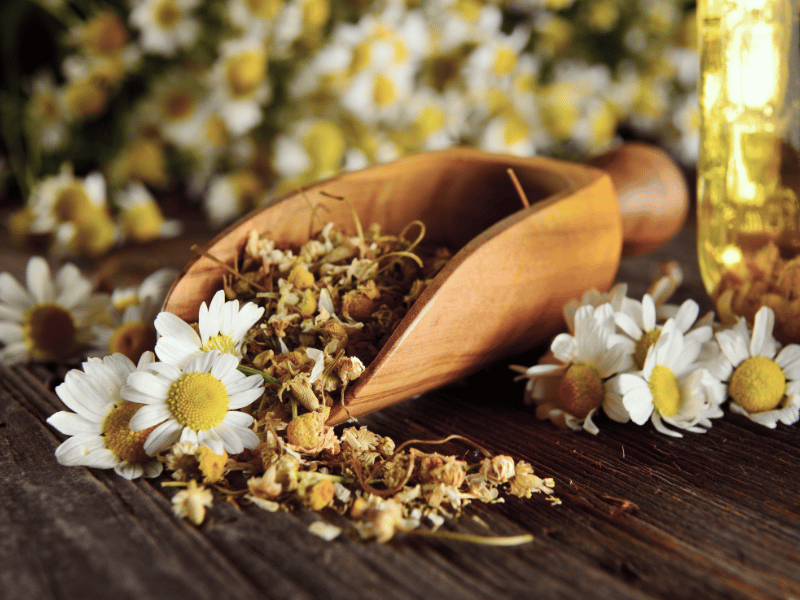
Chamomile is another well-known herb that is highly regarded for its sleep-inducing properties and soothing effects. It is commonly used as a bedtime tea to promote relaxation and reduce anxiety. It is a popular choice for those having trouble sleeping.
Chamomile tea, in particular, is recommended for individuals seeking a natural remedy to achieve a better night’s rest. This fragrant herbal tea is made by steeping dried chamomile flowers in hot water, releasing the herb’s calming compounds. Its gentle, floral aroma and mild, sweet taste make it a comforting bedtime beverage that helps fall and stay asleep.
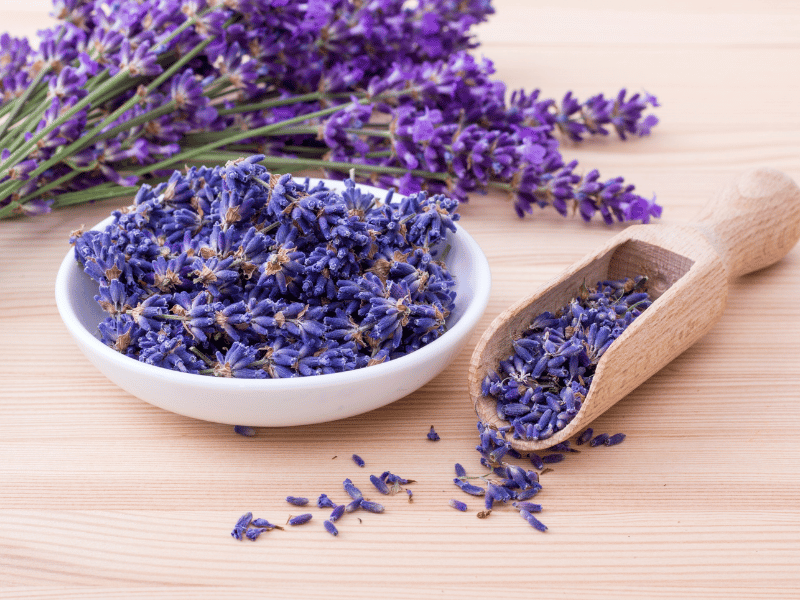
Lavender is a versatile herb known for its delightful aroma and numerous therapeutic properties. This fragrant plant has a long history of promoting relaxation and aiding in sleep. Lavender can be used in various forms, from sachets and lavender-scented pillows to herbal teas and essential oils.
Lavender essential oil is a popular alternative to lavender-based teas and other products. When diffused, applied topically, or added to a warm bath, lavender essential oil releases its soothing scent, which helps calm the mind. Many people turn to this aromatic oil as sleep sprays to create a peaceful and sleep-conducive atmosphere in their bedrooms.
However, it’s worth noting that at the current moment, there isn’t a lot of evidence that points to herbal remedies being able to help with treating insomnia or that they are safe to take along with other sleep medications. Herbal supplements typically tend to interact with certain medicines so you should always seek the advice of a healthcare professional before using any herbal remedies.
All in all, instead of opting for sleep medications or sleeping pills, you may want to try a few natural remedies such as making changes to your sleep habits, consuming foods high in melatonin, or consuming herbal remedies to support your sleep and prevent symptoms of insomnia. However, if you are experiencing severe sleep problems or chronic insomnia, you are strongly advised to seek support for it.
Other ways to fall asleep naturally include the ShutEye® app. ShutEye is an app that monitors your sleep pattern, offering personalized sleep tips to help you improve your nightly sleep quality. Try today for free!
Hansen, A. L., Dahl, L., Olson, G., Thornton, D., Graff, I. E., Frøyland, L., Thayer, J. F., & Pallesen, S. (2014) Fish Consumption, Sleep, Daily Functioning, and Heart Rate Variability. Journal of Clinical Sleep Medicine : JCSM : Official Publication of the American Academy of Sleep Medicine, 10(5), 567 [online]. Available at: https://doi.org/10.5664/jcsm.3714
Losso, J. N., Finley, J. W., Karki, N., Liu, A. G., Pan, W., Prudente, A., Tipton, R., Yu, Y., & Greenway, F. L. (2018) Pilot Study of Tart Cherry Juice for the Treatment of Insomnia and Investigation of Mechanisms. American Journal of Therapeutics, 25(2), e194 [online]. Available at: https://doi.org/10.1097/MJT.0000000000000584
Lin, H. H., Tsai, P. S., Fang, S. C., & Liu, J. F. (2011). Effect of kiwifruit consumption on sleep quality in adults with sleep problems. Asia Pacific journal of clinical nutrition, 20(2), 169–174 [online]. Available at: https://pubmed.ncbi.nlm.nih.gov/21669584/
Markwald, R. R., Iftikhar, I., & Youngstedt, S. D. (2018). Behavioral Strategies, Including Exercise, for Addressing Insomnia. ACSM's Health & Fitness Journal, 22(2), 23 [online]. Available at: https://doi.org/10.1249/FIT.0000000000000375
National Heart, Lung, and Blood Institute (2022) What Is Insomnia? [online]. Available at: https://www.nhlbi.nih.gov/health/insomnia
Pigeon, W. R., Carr, M., Gorman, C., & Perlis, M. L. (2010) Effects of a Tart Cherry Juice Beverage on the Sleep of Older Adults with Insomnia: A Pilot Study. Journal of Medicinal Food, 13(3), 579. [online]. Available at: https://doi.org/10.1089/jmf.2009.0096
Wexler, A. (2017) Does valerian root treat anxiety and insomnia? [online]. Available at: https://www.medicalnewstoday.com/articles/318088